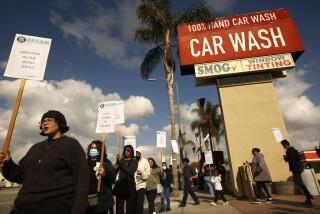Protests reignite as Michigan ‘right-to-work’ bill nears final OK
It’s Wisconsin all over again -- this time in Lansing, Mich., where thousands of protesters are descending on the state capital in a day of action to demonstrate against a “right-to-work” law that may be signed into law this week. They’re outside -- in the snow -- and inside the Capitol, as legislators cast final votes on the bill, which could be signed by Gov. Rick Snyder as early as noon.
The legislation, which would prohibit unions from requiring people to join them in order to be employed, was rushed through the Legislature in a lame-duck session last week. Its rapid movement and the lack of public input into the process have drawn union protests from across the state; on Monday, Michigan’s Democratic congressional delegation met with Snyder to ask him to veto the law, or encourage more public input.
“This is being done politically, rushed through with very little debate -- I don’t think many legislators have seen the law,” said Roland Zullo, a research scientist at the University of Michigan’s Institute for Labor and Industrial Relations. “There’s retribution on many levels here.”
Conservatives want to defund unions, which helped reelect Barack Obama, Zullo said. They also want to push back against a labor initiative from November that would have enshrined collective-bargaining rights in Michigan’s constitution. That initiative failed by a large margin, emboldening conservatives.
Michigan is the latest state in the Midwest to be embroiled in protests after a Republican governor tried to diminish labor rights. The protests have had mixed results. In Wisconsin, after Gov. Scott Walker limited collective-bargaining rights for public employees, thousands of protesters occupied the Capitol, but an election to recall Walker ultimately failed. In Ohio, after Gov. John Kasich pushed through similar legislation, a 2011 referendum repealed the law by a 2-to-1 margin, allowing unions to claim victory.
Indiana passed a similar right-to-work law in early 2012 with less controversy. The law, which Republican Gov. Mitch Daniels said would bring more businesses to the state, has made little difference in union membership in Indiana, said Cindy Estrada, a vice president at the United Auto Workers. When one contract, with 450 workers, was renegotiated, only two workers decided to stop paying union dues. It also hasn’t helped attract more jobs, she said.
“I’m hearing people saying Indiana is attracting more jobs than Michigan – that’s just not true,” she said.
According to Bureau of Labor Statistics data from Indiana, Michigan had more jobs in October, the most recent month available, than it did the year before. Indiana had fewer.
Even if the law is signed, there’s little chance the fight will be over, said Kristin Dziczek, director of the labor industry group at the Center for Automotive Research.
“What’s really unfolding here in Michigan is a long, protracted battle,” she said. “I don’t think labor will walk away and lick their wounds and say they lost this one.”
The Detroit Free-Press estimated that 10,000 protesters had descended on Lansing, shouting slogans such as “Hey, hey, ho, ho, Right to Work has got to go.”
ALSO:
Obama criticizes GOP right-to-work legislation
Unions, buoyed by election results, are taking a stand
Tensions rise in latest battle in Michigan







